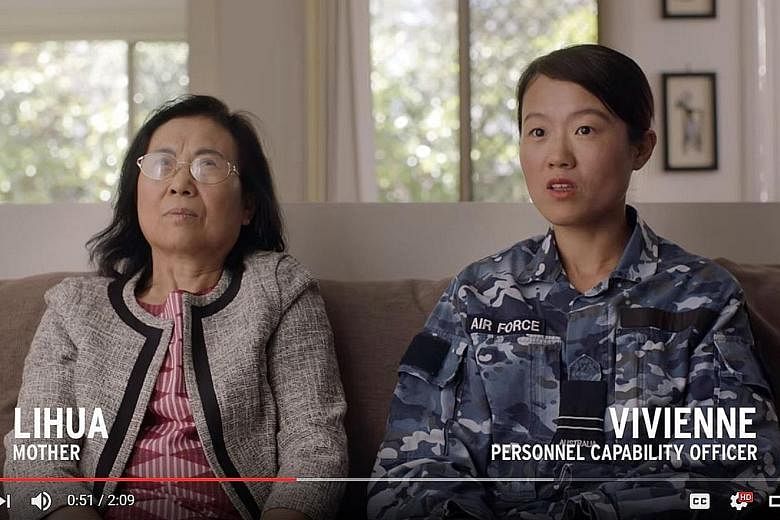In its latest effort to sign up new soldiers, the Australian Defence Force has dispensed with enticing recruits with the promise of "action, adventure and comradeship" as was traditionally done.
Instead, its latest series of advertisements has taken a domestic approach, featuring serving personnel at home, chatting with their parents in the garden or on the couch.
In one of the advertisements, a Chinese-born mother admits to being "worried sick" about her daughter joining the military.
"I didn't expect her to pursue this path," says the mother, named as Lihua. "However, I later realised that she has her own dreams, which do not have to concur with my plans."
The daughter, Vivienne, a serving personnel capability officer, says: "When I first joined, I think I was the only Chinese girl on the base… Everyone went out of their way to help me."
Personnel featured in the eight advertisements belong to various ethnic and religious minorities, including those from Indian, Chinese, Malaysian, Vietnamese or indigenous backgrounds.
The aim is to boost recruitment from these communities, and address the Australian military's ongoing struggle to properly reflect the nation's multicultural character.
-
28%
Percentage of Australians born overseas.
-
5.4%
Percentage of permanent military personnel born overseas.
Even though Australia is one of the world's most culturally diverse countries, its military - which is non-conscription - has had a hard time attracting those from minority and immigrant communities.
The Australian Defence Force currently has 57,000 permanent personnel, of whom just 3,000 - or 5.4 per cent - were born overseas, even though more than 28 per cent of Australians were born elsewhere.
Defence officials have long insisted that the military needs to expand its membership, both to deepen the available talent pool and to attract soldiers who speak various languages and who are familiar with the cultures of the country's regional partners.
"We want to make sure we are recruiting from right across the Australian population," the Chief of the Defence Force, Air Chief Marshal Mark Binskin, said last month.
"Not only for the capability, but to make sure we are representing the community we defend," he added.
In 2013, the military launched a plan to boost its diversity, noting that only 5.4 per cent of its personnel in 2012 came from non-English-speaking backgrounds. The figure rose to just 5.7 per cent in 2015.
The federal government said that the latest campaign was aimed specifically at persuading parents to allow and encourage their children to enlist.
"The Australian Defence Force should reflect the diverse society that is Australia today," Defence Minister Marise Payne said in a statement on July 30.
"A diverse workforce provides a greater range of ideas and insights to challenge accepted norms, and will help strengthen our capability and our operational effectiveness."
Professor Peter Leahy, a former Chief of Army, said he welcomed the effort by the latest campaign to try to "overcome the concerns of mum and dad".
"In some communities, the military is not seen as an obvious career choice," Prof Leahy, now at the University of Canberra, told The Straits Times.
"Often, negative attitudes towards the military are something that migrant communities have brought with them from their home countries. The military might be seen as a repressive force and a force that does not act in the best interests of the community."
In recent years, the military has tried to address some of the factors behind its failure to attract Australians from migrant communities, for instance, by attending community events and by catering to people with special religious needs or who speak English as a second language.
Prof Leahy, who retired from the army in 2008 after 37 years as a soldier, said he had seen first-hand the benefits of having Iraqi-heritage and Afghan-heritage Australian troops during the wars in Iraq and Afghanistan.
"Our roles are primarily offshore," he said. "We need linguists and we need cultural understanding."
He added: "If you are going to be a national institution, it should represent the demographic nature of the nation."


